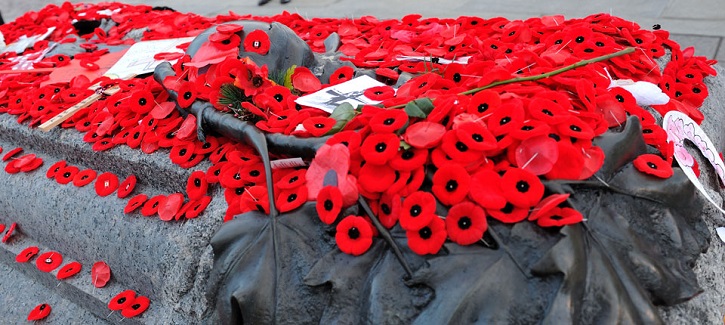“Lest we forget”- that’s the commonly used phrase in many war remembrances services in English-speaking countries the world over. A recent survey suggests our knowledge of the sacrifices that veterans went through during the First World War may be getting fuzzy.
In a survey of six countries whose soldiers fought on the Western Front in World War I, it was found that Canadians are the most likely to have attended a war remembrance ceremony in the past 12 months. However, the Ipsos poll also found that Canadians are among the least likely to say they remember learning about the First World War in school.
The survey was conducted for the Vimy Foundation, and comprised 1,000 interviews in each of Canada, the United States, Great Britain, France and Germany, and 500 interviews in Belgium.
RELATED CONTENT
Aboriginal veterans quietly honoured across Canada
Ombudsman decries delay of benefits for medically discharged soldiers
Veteran’s losing out due to mismanagement of drug benefits
Fully one quarter (25 per cent) of Canadians say they’ve attended a war remembrance ceremony in the past 12 months, while fewer residents of Great Britain (18 per cent), the US (16 per cent), Belgium (14 per cent), France (11 per cent) and Germany (4 per cent) say the same.
Learning about WWI in school
Canadians trail most of the European countries in saying that they remember learning about the First World War in school. Two-thirds (66 per cent) of Canadians and those in Great Britain (64 per cent) remember learning about the First World War in school, behind those in Germany (70 per cent), the US (72 per cent), France (78 per cent) and Belgium (80 per cent), more of whom remember learning about the Great War in school.
The Battle of Vimy Ridge
The year 2017 marks the centenary of the Battle of Vimy Ridge, where it has been argued that Canada became a nation on account of fighting under its own command (not alongside British soldiers) for the first time. Given its significance to Canada, it’s not surprising that Canadians are by far the most likely to have heard of the battle (61 per cent). However, only 17 per cent of those in France have heard of it, despite being the location of the battle. Moreover, only two in ten (20 per cent) Germans have heard of the battle, despite being the opposing force to Canada.
Personal remembrance
Nearly one-half (46 per cent) of those in Great Britain say that they are a descendant of someone who served in the First World War, meaning that they’re the most likely to have a personal connection to the Great War. Fewer residents of France (36 per cent), Germany (34 per cent), the US (31 per cent), Belgium (30 per cent) and Canada (29 per cent) have this type of connection.
In an effort to stay connected to the First World War, many intend to visit a First World War battlefield, cemetery or historic site before the end of 2018, led by those in Belgium (25 per cent), followed by those in the US (19 per cent), France (17 per cent), Canada (11 per cent), Great Britain (10 per cent) or Germany (7 per cent).
Keeping the memories alive
“Remembrance Day allows Canadians to reflect on the sacrifices that come with war,” according to Ipsos. “However, Canadians believe the commemoration should not just end after November 11th and that it is important to remember and understand our history throughout the year.”
In another survey, this one conducted on behalf of Historica Canada, Ipsos found that 86 per cent of Canadians believe that there should be a national monument to pay tribute to our veterans and soldiers as part of Canada’s celebration of the country’s 150th year in 2017.
A majority (62 per cent) of respondents also lamented that Canadian students “are not being taught enough about Canada’s efforts in wartime.”
Nine in 10 or 89 per cent agree that “hearing veterans speak about their experiences is the best way for youth to understand” the past world conflicts, the survey said.
The survey also found that those who have a family member or friend who severed in a conflict are more likely to agree that Canada is a peacekeeping nation.

